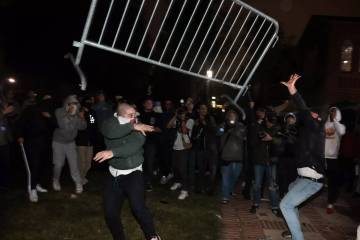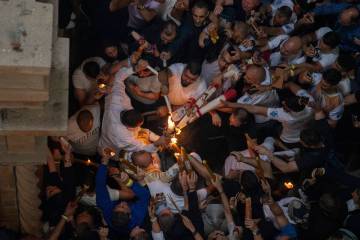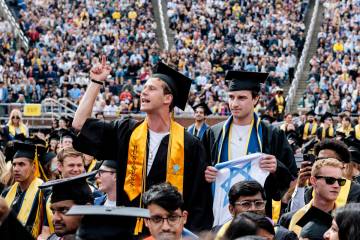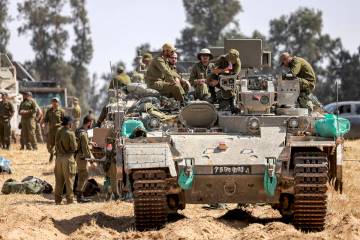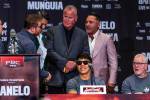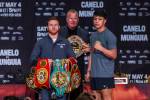Boxing, MMA organizations promise funding for brain study in Las Vegas
WASHINGTON — Fighters currently active as well as a couple of old-timers who moved into the political ring gave a boost on Tuesday to landmark research being done in Las Vegas on how blows from boxing and combat fighting affect the brain.
A Capitol press conference was held to announce a $600,000 contribution being made by leading fight organizations to sustain work conducted at the Cleveland Clinic Lou Ruvo Center for Brain Health.
The center so far has signed up 400 active and retired boxers and martial arts fighters who undergo computerized memory testing, speech analysis and advanced brain imaging on an annual basis. Studies began two years ago, with funding from the Department of Defense among others.
Two million dollars already has been spent on the project, which hopes to enlist 650 fighters for long-term studies that are similar in some ways to research the National Football League and other organizations are funding on concussions and other forms of brain trauma.
“Most head injuries do not produce brain injury, but some head injuries produce a brain injury that starts a process that ends up as something that looks like Alzheimer’s,” said Jeffrey Cummings, medical director of the Las Vegas center.
“We want to know what is the very first change that occurs that we can detect in an athlete,” Cummings said. “And are there predictors? Are there risk factors so we can know which athletes to monitor and which ones are at the greatest risk?”
Charles Bernick, associate medical director, said findings could have ramifications beyond the fighting sports.
“We have no ability at this time to tell these great athletes, those who played in the Super Bowl on Sunday, those who will represent our country at the Olympics, if they are at risk for long-term complications from head trauma,” Bernick said. “We have no way of even detecting them very early when intervention may be most effective.”
The event also served to bring together a fraternity of fighters, Las Vegas-based fight executives and Sens. Harry Reid and John McCain, former boxers who swapped stories as well as commitments to improve the health of ring participants.
Reid, D-Nev., was an amateur boxer in his youth. McCain, R-Ariz., boxed at the U.S. Naval Academy. Both have been involved in legislation related to boxing since the mid-1900s. Two years ago the senators introduced a bill that created the United States Boxing Commission to oversee boxing matches around the country.
“I fought in the ring at a low caliber level but I’ve judge hundreds of fights,” Reid said, including one involving Sugar Ray Robinson.
“He looked good but he fought too long,” Reid said of Robinson. “We all know he wound up really sick. This handsome man didn’t know where he was when he died.”
“It’s good we’re studying this,” Reid said. “It’s important so we cannot only determine the long-term effect, but also find out if some people should stop what they’re doing.”.
Todd duBoef, president of Top Rank Boxing; Lorenzo Fertitta, chairman of the Ultimate Fighting Championship; and Kevin Kay, president of Spike TV that presents Bellator MMA and GLORY kickboxing, participated in the news conference. Several joked it was noteworthy in its own right that the organizations, usually fiercely competitive, teamed up to fund research.
The executives brought along some of their top fighters — light heavyweight champ Jon Jones and light heavyweight contender Glover Teixeira of UFC, WBO junior lightweight champion Mikey Garcia, and former Bellator lightweight champion Michael Chandler.
Also taking part was Larry Ruvo, director of Southern Wine and Spirits of Nevada and founder of the center named after his father who died of Alzheimer’s disease in 1994, and Sig Rogich, former state boxing commissioner and one-time head of the Nevada Athletic Commission.
“We all know this study is much needed because if we don’t do this, I’m afraid that support for these incredible, entertaining sports will wane on the part of the American people,” McCain said. “It may not have much effect on our present champions but we owe it to the future of the sport. We owe it to the future of the men and women who engage in it.”
Bernard Hopkins, partner in Golden Boy Promotions who still fights and who won a light heavyweight boxing championship last year at age 48, said the public that tunes into big-time fights sees little of the behind-the-scenes training that causes most of the physical stress.
“It’s the final icing on the cake when the event happens.” said Hopkins, who began fighting professionally in 1988. “But it’s the training, the nine weeks, the eight weeks, the sparring with two or three guys a day and the pounding day in and day out. That’s when the damage starts, not actually at the fight, but the accumulation in the gym.”
“My demeanor, my articulate speech, always is jeopardized by what I have done for so long,” Hopkins said. “Yes we chose to sign up for this, but it also is for your entertainment. We sort of have a deal without having a deal. We just need the good doctors to back us for the long haul.”
Said Chandler: “At the end of the day I’m excited to become the best in the world. But I’m also excited about being able to play football in the front yard with my children someday, and that is more important than any gold you can put around my waist.”
Las Vegas Review-Journal writer Paul Harasim contributed to this report. Contact Stephens Washington Bureau chief Steve Tetreault at 202-783-1760 or STetreault@stephensmedia.com. Follow him on Twitter @STetreaultDC.





